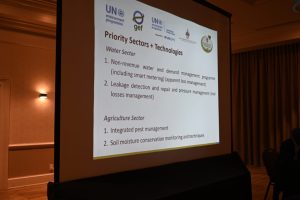BASSETERRE, St Kitts, 27 March 2024 – The Ministry of Environment, Climate Action and Constituency Empowerment through the Climate Action Unit held its third capacity-building workshop centred on training nationals in key sectors on the Technology Needs Assessment (TNA) Process from 26-27 March 2024 at the St Kitts Marriott Resort.
 The TNA Process involves a comprehensive assessment of available mechanisms, needs and opportunities across different sectors to identify technologies with the highest potential to mitigate climate change and adapt to its impacts.
The TNA Process involves a comprehensive assessment of available mechanisms, needs and opportunities across different sectors to identify technologies with the highest potential to mitigate climate change and adapt to its impacts.
The final step in this process is the preparation of a Technology Action Plan (TAP), for which this workshop is centred around. It aims to support the implementation of the prioritized technologies identified in water, agriculture, energy and transport sectors. The workshop supports the preparation of TAP which is aimed at identifying, selecting and implementing climate technologies to reduce greenhouse gas emissions and to minimize the Federation’s vulnerability to climate change. In principle, the TAP serves as a bridge between the analysis of prioritised technologies and their implementation.
The TAP will systematically suggest practical actions necessary to reduce policy, finance and technology-related barriers to enhance climate resilience and reduce greenhouse gas emissions.
Cheryl Jeffers, TNA Coordinator for St Kitts and Nevis said it is critically important for citizens to understand their climate technology needs.
She said, “As a Small Island Developing State (SIDS), St. Kitts and Nevis is vulnerable to the impacts of climate change. One of the key pillars to responding to climate change is the enhancement of technology, and the transfer, and dissemination of information.”
The TNA process has three main steps including the TAP. The first focused on the identification and prioritization of sectors and technologies. The second centred on barrier analysis and enabling framework identification.
With a changing climate, St. Kitts and Nevis must develop and utilize the most appropriate decision-support tools and methodologies.
The TAP Workshop was organized in collaboration with the University of the West Indies, Jamaica and delivered in collaboration with the UN Environment Program-Copenhagen Climate Center in Denmark.
